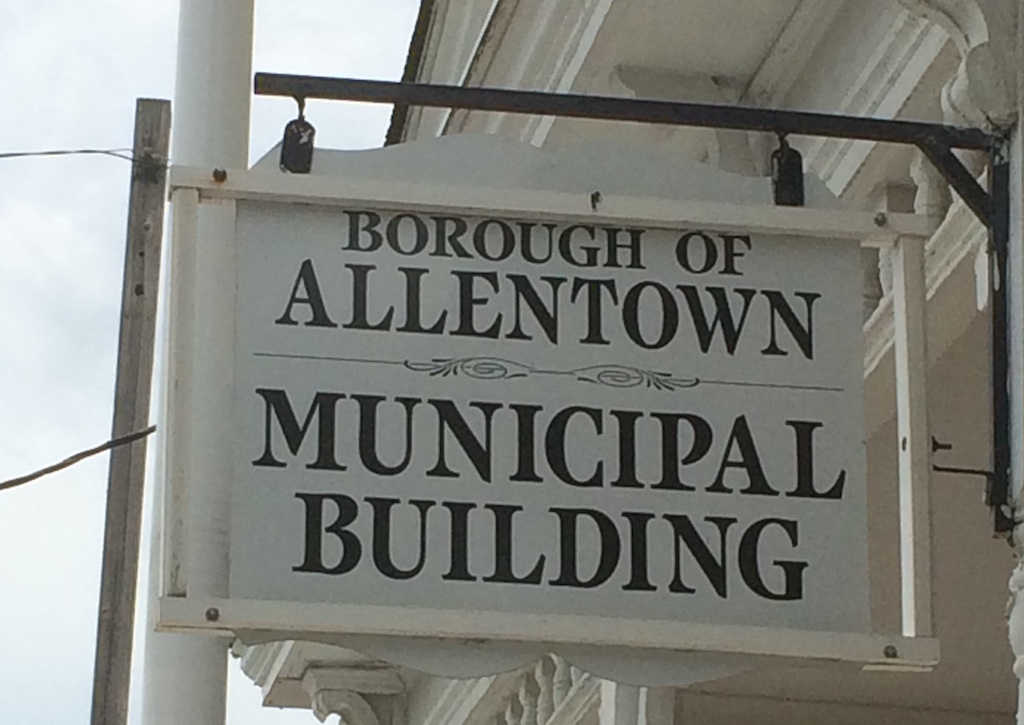ALLENTOWN – The Allentown Borough Council has adopted a $2.98 million budget to fund the operation of the municipality during 2020.
The budget that was adopted during the council’s April 21 meeting does not include an increase in the municipal tax levy from 2019 to 2020.
Council President Robert Strovinsky, Councilwoman Angela Anthony, Councilwoman Martha Johnson, Councilman John A. Elder III, Councilman Michael Drennan and Councilman Dan Payson voted “yes” on a motion to adopt the budget.
Drennan chairs the borough’s Finance Committee and presented the budget. The council meeting was live-streamed during the ongoing coronavirus pandemic.
Drennan was joined in the Borough Hall meeting room by Mayor Thomas Fritts and Municipal Clerk Laurie Roth. The other council members and Chief Financial Officer June Madden joined the meeting by telephone.
Drennan said the 2020 budget would be supported in part by the collection of $1.58 million in a local tax levy from Allentown’s residential and commercial property owners. That is the same amount of taxes that was collected in 2019.
Municipal officials will use $566,000 from surplus funds (savings) as revenue in the budget and expect to receive $131,595 in state aid. The remainder of the borough’s revenue in 2020 will come from grants and miscellaneous revenues.
When the 2020 budget was initially developed by borough officials and Madden, the spending plan proposed an increase in the municipal tax rate of 7.5 cents per $100 of assessed valuation, according to Fritts.
When Madden discussed the budget during a Feb. 25 council meeting, she reported that the projected increase in the municipal tax rate had been revised downward to 3.5 cents per $100 of assessed valuation.
Then the coronavirus pandemic hit and municipal officials took another look at the budget. To keep the $1.58 million tax levy flat from 2019 to 2020, officials increased the amount of surplus funds to be used as revenue this year from a projected $500,000 to $566,000.
The appropriation of the additional $66,000 from surplus funds eliminated the anticipated 3.5-cent increase in the municipal tax rate.
Drennan said Allentown’s municipal tax rate will hold steady at about 82.2 cents per $100 of assessed valuation.
In 2019, the average home in Allentown was assessed at $290,842. With a tax rate of 82.2 cents, the owner of that home paid about $2,390 in municipal taxes.
In 2020, the average home in Allentown is assessed at $291,600. With a tax rate of 82.2 cents, the owner of that home will pay about $2,396 in municipal taxes.
Municipal taxes are one item on a property owner’s total tax bill. Allentown property owners also pay Upper Freehold Regional School District taxes and Monmouth County taxes.
The amount an individual pays in property taxes is determined by the assessed value of his home and/or property and the tax rate that is set by each taxing entity.
Drennan said when Upper Freehold Regional School District taxes and Monmouth County taxes to be collected from Allentown’s property owners are added to the $1.58 million to be collected in municipal taxes, the borough’s property owners will pay a total of about $6 million in property taxes in 2020.
Allentown’s municipal budget for 2019 totaled $2.48 million and was supported by the collection of $1.58 million in taxes from the borough’s property owners. Other revenue in the budget included $375,000 from surplus funds and the receipt of $131,595 in state aid.
“I want to congratulate the Finance Committee,” Fritts said. “It was a fight to go through the budget with a fine-tooth comb and look at how we were spending money over the last few years.”
Selected appropriations in the 2020 municipal budget include the following line items: police salaries and wages, $526,000, up from $486,500 in 2019; police other expenses, $52,395, up from $50,071 in 2019; garbage and trash removal, $190,000, up from $155,000 in 2019;
Also, payment to the Police and Firemen’s Retirement System of New Jersey, $125,517, up from $111,082 in 2019; payment to the Public Employees Retirement System, $38,468, down from $39,478 in 2019; employee group health insurance, $70,000, up from $61,400 in 2019;
And, aid to the Hope Fire Company, $34,000, no change from 2019; contribution to the Allentown First Aid Squad, $12,597, down from $22,560 in 2019.
According to the U.S. Census Bureau, Allentown had a population of 1,788 residents in 2018.
In other business, Fritts thanked residents for continuing to observe social distancing guidelines during the health crisis. He said that as of April 21, there were four reported positive cases of COVID-19 in Allentown.
Fritts said the borough’s Heritage Park remains open for exercise and fresh air.
Payson commented on the situation, saying, “Our emergency services personnel – police, fire and medical – are doing an amazing job maintaining safety in our town while keeping themselves safe. As residents, we are really appreciative for them.”

